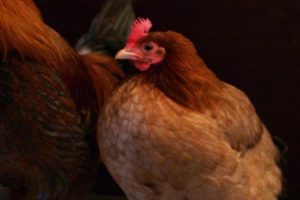 The rise of backyard chickens in Northern Virginia has sparked a heated policy debate in Arlington, but it has also led to an increase in abandoned chickens showing up at shelters.
The rise of backyard chickens in Northern Virginia has sparked a heated policy debate in Arlington, but it has also led to an increase in abandoned chickens showing up at shelters.
In 2011, Prince William County approved a measure that allowed raising birds on some residential properties. Since then, the number of chickens that the Prince William County Animal Shelter has taken in has risen.
In 2011, the shelter — which also accepts chickens from Arlington, since the Animal Welfare League of Arlington does not house poultry — saw 23 chickens. After Prince William passed its new ordinance, the number of chickens at the PWCAS jumped to 33 in 2012 and 29 already in 2013.
According to Laurie Thompson, an administrator with the PWCAS, the first 16 chickens the shelter took in this year were strays, a number she noted was both unusual and likely attributable to abandoned chickens.
“If somebody knows how to handle a chicken and they keep their numbers down low and don’t have roosters that are going to crow, then it’s probably okay having one or two hens for eggs,” Thompson told ARLnow.com. “But sometimes, people can get excessive with these things, keep bringing them in, and then it becomes a health hazard with chicken feces. It’s not really good for an urban area to have all those feces to deal with, because those can bring in rats.”
Arlington residents are allowed to raise poultry in an enclosure 100 feet or more from property lines, but a debate has grown in the past year around reducing the limit. Last month a majority of the county’s Urban Agriculture Task Force, created in 2012, recommended reducing the enclosure limit to 20 feet from a property line, but allowing no more than four hens, no roosters and requiring permission from neighbors.
The recommendation is being considered by county staff, which will then make its own recommendation to the County Board. The Board is not expected to take action on the subject until the fall.
Animal Welfare League of Arlington spokeswoman Kerry McKeel said the organization participated in a discussion about backyard chickens with the task force, but hasn’t otherwise offered any opinions about the implications of additional urban hen raising.
“At this point a decision has not been reached on how the ordinance will be changed, so at this time AWLA does not have a position on the issue,” she said. In the past year, McKeel said the AWLA has picked up four roaming chickens and sent them either to Prince William or farm sanctuaries in rural Virginia or Maryland.
One of the country’s biggest farm sanctuaries that takes in chicken spoke out against backyard chickens to NBC News earlier this month.
“They’re put on Craigslist all the time when they don’t lay any more… They’re dumped all the time,” said Susie Coston, national shelter director at the Farm Sanctuary based in Watkins Glen, N.Y.
Arlington Egg Project, which has advocated for more flexible laws allowing chickens in Arlington backyards, issued a response after the task force’s June recommendation.
“Keeping small numbers of backyard hens is good for people, good for the natural environment, and good for hens,” the statement reads. “That’s why a large and increasing number of American communities embrace backyard hens.”







